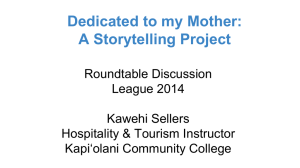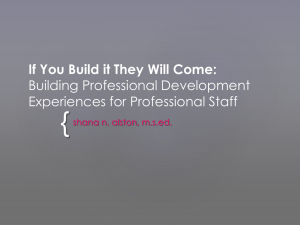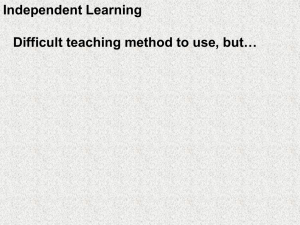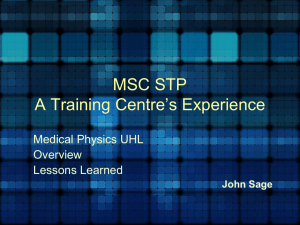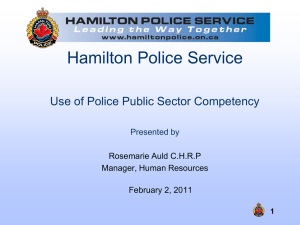2012-WRAMTA-Competence-presentation
advertisement
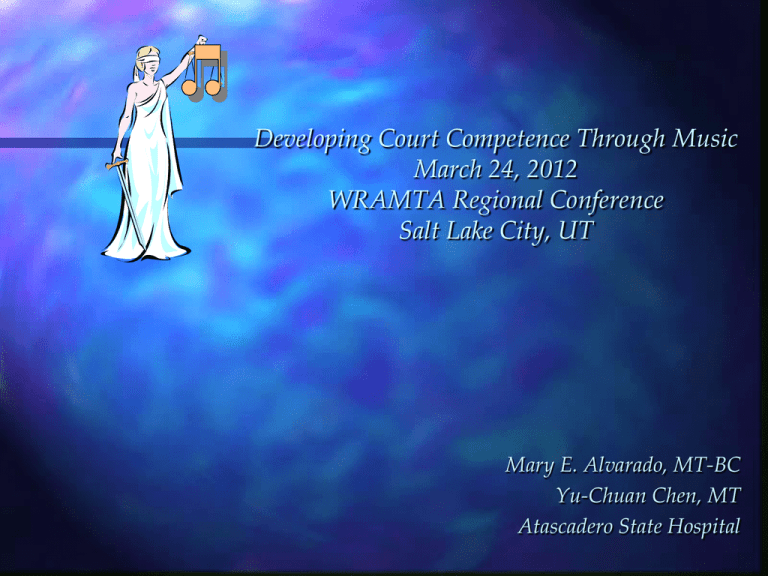
Developing Court Competence Through Music March 24, 2012 WRAMTA Regional Conference Salt Lake City, UT Mary E. Alvarado, MT-BC Yu-Chuan Chen, MT Atascadero State Hospital Atascadero State Hospital – A Quick Look • Current Population +/- 1000 • All Adult Male Forensic • • • • Mentally Disordered Offenders Not Guilty by Reason of Insanity Referrals from CDCR Incompetent to Stand Trial Incompetence to Stand Trial • Most countries don’t have competency to stand trial laws • U.S. states have fairly consistent laws from state to state • Theory is that it is improper to try someone in abstentia • Mental illness could constitute “mental abstentia” Incompetence to Stand Trial • Law distinguishes those who have free choice to be present versus those who do not (mentally ill) • Competency to stand trial standard two pronged • Rational understanding of charges and procedures • Ability to rationally assist attorney in presenting defense Incompetent to Stand Trial • Dusky v US: • Defendant must have a “present ability to consult with his lawyer with a reasonable degree of rational understanding” and “factual and rational understanding of the proceedings” Jackson v Indiana: • Placed time limits on length of confinement as incompetent to stand trial • Reasonable period to determine there is substantial probability of regaining competency in foreseeable future Incompetent to Stand Trial • Sell v. U.S. 2003 • Involuntary forced medications is balance between government interests and individual rights • Non-dangerous defendants can be forced medicated only under certain conditions • Treatment is medically appropriate • Side effects won’t undermine fairness of trial • Less intrusive methods unlikely to work Who Decides Incompetence??? • Court officer (DA, PD, judge) can raise doubt • Judge determines “official doubt” based on substantial evidence • Court appoints 2-3 evaluators • Speedy trial clock stops • Bail revoked, if on OR and taken into custody Who Decides Incompetence? • Hearing held after receipt of reports • Jury trial if either side requests • Hearings can only occur in Superior Court Competency Program in ASH Admission Unit • From 1st day to two months or so • Goal: Become competent to stand trial by attaining mental stability, familiarity with the treatment program at ASH and participation in the competency tests Treatment Unit • Currently ASH has 2 treatment units. • Goal: Essentially the same as on admissions however treatment units also clarify diagnoses, refine medication regimens and enhance resources as necessary to assist with attaining competency. Competency Tests • R-CAI (Revised-Competency Assessment Instrument) or other instruments as indicated by the needs of the patient • Mock Trial • Clinical Staffing • Forensic Staffing • Outcome: 1) Competent to stand trial, 2)Malingering, and 3) Non restorable to competency The Clinical Picture • Mentally Ill • Upon admission typically psychotic, unstable • Poor self care • Possibly aggressive • Responds well to medication • Once in stabilization mode is willing to participate in treatment to attain competency • May have behavioral issues/delusions that will impact upon competency • May have learning or cognitive deficits that slow progress towards competency • Malingering • Upon admission appears non psychotic, easily able to make needs known • Often excellent self care • Becomes the “king pin” on the unit • Shows no response to medication or atypical response • Unwilling to comply with testing and treatment • Often has multiple physical concerns needing staff attention • Can be aggressive if needs are not met to satisfaction or as a means of intimidation 2011 Statistics • • • • Total IST admitted to ASH – 268 Total returned to court (all reasons) – 381 Average length of stay – 139 days Total passing all tests – 356 (average 126 days) • Discharged with Malingering Dx – 19 • Discharged as “non restorable” – 21 • 7 completed the 3 year statute Competency Treatment Groups Trial Competency • Has demonstrated ability to concentrate for extended period • Goal: To improve knowledge of court information Competency through Activities • Typically more challenged patient with poor ability to concentrate and needs repetitive information • Goal: To improve knowledge of court information • Additional Treatment as Indicated • • • • • • • • • Medication Education Substance Abuse Depression Management Neuro/Cognitive Services Compulsory Education Anger Management Leisure & Recreation Social Skills Medical/Physical Music Therapy at ASH • Currently 18 Music Therapists and 1 intern • Groups provided both in a centralized music center and throughout the hospital • Groups range from insight oriented lyric analysis to emotive improvisation to social expression and just good old bands. (which provide all of the above!) Developing Court Competence Through Music • All Functioning Levels • Goals: • Address ambivalence about returning to court • Identify problematic behaviors contributing to barriers to competency • Provide “safe space” emotional expression for feelings related to being arrested, charged and committed for treatment • Reinforce court information • Increase attention span Characters of the Court Improvisation • • • • • • • • • • Judge District Attorney Public Defender Bailiff Defendant Witness Jury Member Friend Family Member Court Reporter • Objectives: • Reinforce knowledge of key roles in the court room • Warm up and ground the group • Encourage focus and attention • Interpret non verbal communication Court Scenario Process • Objectives • Non verbal expression of feelings related to returning to court • Clarification of concerns related to IST issues • Pre problem solving of potential situations IST patients could encounter upon return to court • Resolution of ambivalence for those attempting to avoid return to court due to fears of long sentence, “injustice of the system”, etc. Court Scenario Chant • “The Court is the place that needs your face” • ….so get there Structured Songwriting • Objectives: • Expression of concerns about being found Incompetent to Stand Trial • Group Identity/Group Cohesion as a distinct population at ASH • Instillation of hope during a time of great uncertainty • Humor Developing Court Cooperation Through Music Mary Alvarado: MALVARADO@ash.dmh.ca.gov Yu-Chuan Chen: YCHEN@ash.dmh.ca.gov



